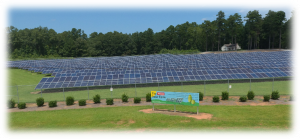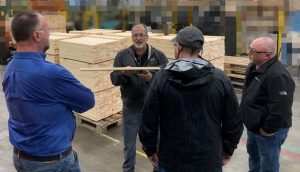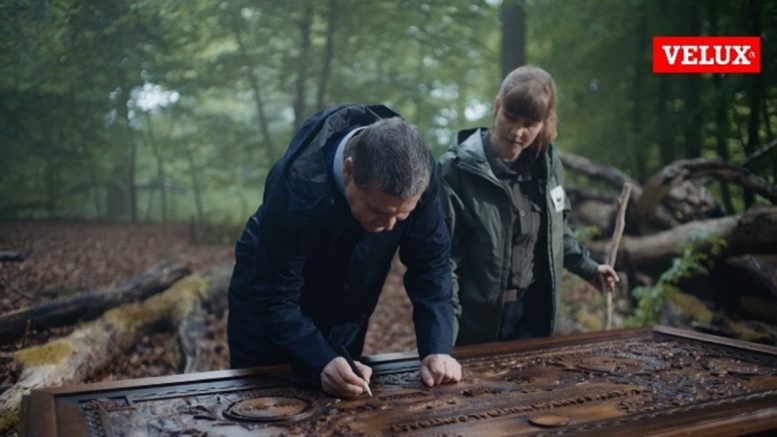Lifetime Carbon Neutral
A company’s carbon “footprint” is the impression that it leaves behind – the legacy of its impact on the environment. Achieving carbon neutrality is an active goal for most manufacturers. Corporate leadership realizes that it is not only the right thing to do for our Earth but that there is often financial benefit realized from achieving this goal.
The VELUX Group is pioneering this goal in their company to an entirely new level and is raising the bar for corporate responsibility. In cooperation with the World Wildlife Fund (WWF), VELUX took an oath to become Lifetime Carbon Neutral by 2041 at their 100-year anniversary. They are among the first companies in the world – and the first in the construction industry – to take responsibility for not only future CO2 emissions but also those from their past. VELUX launched this commitment as part of their Sustainability Strategy 2030.
VELUX is the market leader in manufacturing of skylights and roof windows. On April 5, 2022, their Greenwood, South Carolina site presented their sustainability program to peer OpExChange members and provided a facility tour of their remarkably sustainable wood processing plant.
“It’s Our Nature” – Sustainability Strategy
Carl Rogers, Operational Excellence Manager, and Jamilah Nelson, Environmental Coordinator tag-teamed to provide a detailed overview of both the VELUX product-line and the Sustainability Strategy 2030 Plan. This ten-year program, coined as “It’s our Nature,” was launched in 2020. It comprehensively builds upon a foundation of securing a responsible business, incorporating sustainability in product design, and pioneering climate and nature action to achieve lifetime carbon neutrality by 2041.
In the 2020 launch event for this strategy, CEO David Briggs asserted that:
“Sustainability is totally in our roots. It’s in our DNA. It is not something that has been written by a communications agency in the last ten years because they say this is what is fashionable to look like as a company. This is VELUX. This is who we are.”
Carl re-emphasized that VELUX has always been committed to environmental concerns and shared the three reasons why they raised the bar in 2020:
- Our world needs it: The United Nations christened the 2020s as “The decade of Action.” To limit climate change and the nature crisis, everyone must do their part. Businesses are an essential component to save our planet.
- It’s who we are: From the beginning of the organization, VELUX strived to be a model company – one that other companies strive to emulate. Sustainability is deeply ingrained within VELUX’s core values.
- It’s good for business: As a market leader, VELUX has to be ahead of the curve. Sustainability must be reflected in their business, reputation, and brand. Sustainability is also on the radar for end users and impacts their buying decisions.
The Foundation for Sustainability
The foundation for VELUX’s sustainability plan is to ensure a responsible business. As part of their 2030 strategy, they established nine ambitious projects for this foundation. Each project is well-defined and relates directly to their business. Jamilah shared a few of these with the team, particularly as they related to recycling and landfill reduction. There are thirteen item families that are recycled at the Greenwood plant. The top five categories by recycled weight are wood, cardboard, metal, and glass. Of these, wood is the highest category recycled with approximately 7.1 tons salvaged since 2018.
Recycling & Landfill Impact
Prior to 2018, VELUX Greenwood made up 57% of the total landfill waste generated of their entire global corporation. Jamilah commented that although they strive to be number one in most metrics, this is not one they wanted (or expected). When this became known, it sparked renewed efforts in Greenwood to evaluate their processes. They put together a project team to investigate, strategize and create a plan. Through this analysis, inclusive of hands-on “dumpster diving,” they identified that glass waste represented their largest opportunity.
Previously, they were unable to identify a suitable vendor that could recycle their glass waste. All of this went directly to a landfill. They turned to the Department of Commerce which organized a match-maker event for them to identify potential partners. As a result, they found a vendor that collaborated with them to convert this to recycled material. Since 2018, they have recycled approximately 912 tons of glass waste that would have previously gone to the landfill.
The team went after their second highest category of opportunity which was completed skylight assemblies. This was a bit more challenging in that they needed to find a partner that would take completed product and tear it down into separate recyclable waste streams. They were successful, however and found a local vendor that took this on. Since 2018, they have recycled approximately forty-four tons of this waste that would have previously gone to the landfill.
The overall success of the Greenwood team in the last four years is impressive. They have reduced annual usage from 1,000 tons in 2018 to 387 tons in 2021 – a 61% reduction.
Solar Power
 As you arrive to the campus, you cannot miss the huge solar field across the street. VELUX constructed this 1.3 MW farm in 2017 as part of their sustainability plan as well as their operating cost. This field generates enough clean energy to power five of the Greenwood production plants.
As you arrive to the campus, you cannot miss the huge solar field across the street. VELUX constructed this 1.3 MW farm in 2017 as part of their sustainability plan as well as their operating cost. This field generates enough clean energy to power five of the Greenwood production plants.
Since implementation, the farm has generated approximately 9.3 MW of renewable energy. More importantly, this saves 1,450 tons of CO2 that would have been generated from coal fire production. That is the equivalent of removing 251 gas-combustion cars from the road!
Wood Processing Plant Tour
After the presentations and discussion, the OpExChange group split into two groups for an interactive plant tour of their wood processing plant. This facility converts two-by-four wood strips into high- quality frames for the skylights.
 Scott Brown, the Operational Excellence Coordinator with VELUX and was one of the tour guides. He has been with VELUX in Greenwood for twenty-seven years. He walked the team through how they are addressing wood waste throughout the process.
Scott Brown, the Operational Excellence Coordinator with VELUX and was one of the tour guides. He has been with VELUX in Greenwood for twenty-seven years. He walked the team through how they are addressing wood waste throughout the process.
A dust collection system collects dust continuously from their automated processing equipment. An auger system distributes the dust to completely fill trailer.
A wood-chipper processes all other wood waste generated. All of this is then sent to a pet-bedding manufacturer that will reuse this material for both dogs and horses. This also generates an additional revenue stream for the site!
Scott pointed out that a good continuous improvement program seeks not only to make beneficial use of the end product waste, but it also strives to reduce waste at each point in the process. As the group walked through the beginning of the process, Scott said, “This is where the magic starts.” A high speed, automated line automatically loads the wood strips into the line.
A visual inspection system inspects each board and utilizes a linear optimizer algorithm to determine where the boards should be cut to minimize waste. All pieces that are excess cut-offs are automatically sent by overhead conveyor to their finger joint process. This process will then combine the shorter strips to make useful lengths for the interior portion of a frame.
Forest Conservation
In order to achieve lifetime carbon neutrality, companies will have to do more than just become sustainable at their sites. VELUX is helping to define the path towards lifetime neutrality. Working with the WWF, VELUX will have five active forest projects across the globe. These projects will both protect and restore forests in Ecuador, Uganda, Myanmar, Madagascar, and Vietnam. Through reforesting and avoiding deforestation in these key locations, they will utilize the trees unique abilities to capture CO2 from the air, photosynthesizing this into oxygen, and erasing their historical carbon footprint.
VELUX still has work to do to achieve both their 2030 milestone for annual carbon neutrality and their 2041 goal of lifetime neutrality. They also have a vision and strategy on how to accomplish this. They are involving employees in this not only in their plant operations but also from a personal standpoint. In 2022, each employee will receive a tree to plant and upload to a digital VELUX World map that tracks the progress.
Sustainability – Part of Strategic Plan
Sustainable manufacturing is more important now than ever before. Not only is it the right thing to do for the planet but it also can prove to be operationally cost effective. It might even provide a revenue stream from materials previously going to the landfill.
VELUX strives to be a model organization that other companies aspire to emulate. The work they are doing at their Greenwood plant is remarkable and the commitment they took as a company is inspirational. The OpExChange is grateful that they shared some seeds of sustainability with their peers in South Carolina companies that can be planted at their sites.
About Velux
For more than 80 years, the VELUX Group has created better living environments for people around the world; making the most of daylight and fresh air through the roof. Their product programme includes roof windows and modular skylights, decorative blinds, sunscreening products and roller shutters, as well as installation and smart home solutions. These products help to ensure a healthy and sustainable indoor climate, for work and learning, for play and pleasure. They work globally – with sales and manufacturing operations in more than 40 countries and around 11,500 employees worldwide. The VELUX Group is owned by VKR Holding A/S, a limited company wholly owned by non-profit, charitable foundations (THE VELUX FOUNDATIONS) and family. In 2019, VKR Holding had total revenue of EUR 2.9 billion and THE VELUX FOUNDATIONS donated EUR 178 million in charitable grants. For more, information, visit www.velux.com.
About OpExChange
The OpExChange, sponsored by the SCMEP, is a peer-to-peer network of companies in South Carolina known for generating success for members through benchmarking and best practices activities. Member companies host events and share practical examples of industrial automation, lean manufacturing improvements, and leadership development. It is an invaluable resource to South Carolina companies that provides access to others who are on similar improvement journeys. If you are interested in joining, contact Mike Demos (Mike@OpExChange.com) or visit the OpExChange website to see current companies: https://www.scmep-online.org/pages/memberlisting


Be the first to comment on "VELUX Lifetime Carbon Neutral Plan – It’s Our Nature"